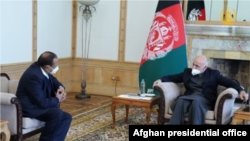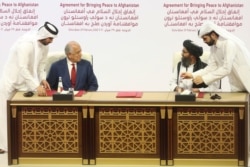India’s national security adviser, Ajit Doval, traveled to Afghanistan Wednesday, where officials said he discussed with President Ashraf Ghani cooperation against terrorism and Afghan peace-building efforts.
Doval’s visit comes just days after India officially began its two-year tenure as a non-permanent member of the 15-nation United Nations Security Council, where it will chair three crucial sanctions committees, including one related to the Islamist Taliban of Afghanistan.
The Taliban Sanctions Committee designates individuals and entities associated with, and supplying, selling or transferring arms to the Afghan insurgent group. Those listed are subject to an asset freeze, arms embargo and travel ban.
“Both sides discussed counterterrorism cooperation and efforts for building regional consensus on supporting peace in Afghanistan,” Ghani’s office said after his meeting with the Indian national security adviser.
The Afghan president vowed that his country and India “in joint efforts with NATO and the United States, will be able to succeed in the fight against terrorism.” In return, Doval offered assuring more cooperation” with Kabul.
India has long denounced the Taliban and accused rival Pakistan of sheltering and backing the Islamist group’s violent campaign against the Afghan government.
Islamabad denies the charges, and in turn alleges New Delhi is using Afghan territory to plot cross-border terrorist attacks against Pakistan, which shares a 2,600-kilometer mountainous border with Afghanistan.
Pakistani leaders also accuse India of working to subvert U.S.-initiated Afghan peace efforts.
US-Taliban deal
The U.S. credits Islamabad with facilitating Washington’s landmark pact with the Taliban in February 2020, and the ensuing peace dialogue between the insurgent group and a team representing Kabul.
The so-called intra-Afghan negotiations underway in Qatar are aimed at finding a political power-sharing deal that would end nearly two decades of war in Afghanistan.
The U.S.-Taliban deal requires all American and NATO troops to leave Afghanistan by May 2021, to close what has been America’s longest war in return for the insurgent group’s security assurances.
The U.N. Security Council’s sanctions committee has listed several top insurgent leaders, and removal of their names is one of the key provisions in the U.S.-Taliban deal.
A Taliban spokesman played down the significance of India taking charge of the sanctions committee.
“The issue of the Security Council’s blacklist is part of our agreement with the U.S. and America is committed to ending the blacklist,” Zabihullah Mujahid told VOA when asked for his group’s reaction. He declined further comment.
Wednesday’s visit to Kabul by Doval followed reports suggesting New Delhi could boost military assistance to Afghanistan in the wake of the U.S.-led international military drawdown.
The assurance was given last week by the Indian foreign minister in a phone conversation with his Afghan counterpart, Indian media reported.
The Pakistani military this week reiterated allegations the Indian spy agency, Research and Analysis Wing (RAW), is operating militant camps in Afghanistan and backing Islamic State loyalists there to conduct terrorism.
“As far as Afghanistan is concerned, yes, there is Daesh footprint over there and it is being supported by RAW, and there is a lot of evidence available on that account,” Pakistani military spokesman Major-General Babar Iftikhar told a news conference Monday. He used the local name for Islamic State’s Afghan affiliate.
Both New Delhi and Afghan leaders reject Pakistani allegations.





